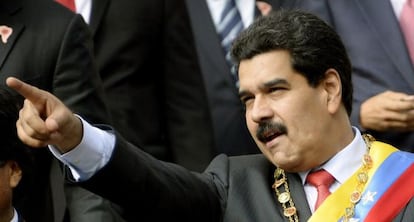Venezuela seeks to block news reports on crime and murder
Prosecutors file complaint against El Universal for harming children’s psychological welfare

The Venezuelan Attorney General’s Office has filed a court complaint against El Universal and is seeking an injunction prohibiting the leading daily in Caracas from covering crime stories, officials said Tuesday.
According to the complaint, El Universal, one of Venezuela’s oldest newspapers, violated government regulations concerning the protection of juveniles and contributed to “the destabilization of the Venezuelan people” when it published a photograph on November 20 of a murdered man lying in the street.
The photograph showed the victim covered in a plastic trash bag with his arms stretched out, lying near a sidewalk that was covered with blood.
Lobsang Rodríguez was a 28-year-old engineer who had been kidnapped on November 18 outside of Caracas by a gang who attempted to hold him for ransom. He worked for the affiliate of a German pharmaceutical company.
The day after his kidnapping, police located a group of men in a vehicle in the Caracas neighborhood of La Florida. After the kidnappers were alerted, heavy gunfire was exchanged and Rodríguez was hit as he tried to escape, according to the official police version.
His body remained on the street for hours until a prosecutor arrived. In Venezuela, only a judicial official can give the authorization for forensic authorities to take away a body.
We are going to use all the resources we have available” against ‘El Universal’
A photographer from El Universal took the image of Rodríguez, which was published on the newspaper’s front page the following day.
Crime and insecurity are one of the biggest problems facing Venezuelan President Nicolás Maduro. The country’s murder rate is one of the highest in the world and Caracas is considered one of the top five most dangerous cities globally, according to the US-based Citizen Council for Public Safety and Criminal Justice. But Maduro – much like his predecessor, the late Hugo Chávez – has been unable to stamp out the soaring violence.
As soon as the daily hit the newsstands, Maduro criticized El Universal for putting the photo on its front page. Interior Minister Miguel Rodríguez Torres, who is the military official responsible for public security, said that the newspaper “undoubtedly deserves legal action […] and we are going to use all the resources we have available.”
On November 27, two prosecutors filed a complaint to the effect that El Universal violated the Children and Adolescents Protection Law and asked a court to issue a fine against the newspaper equivalent to between one and two percent of its total sales last year.
They also asked for an injunction to prohibit the daily from “publishing images, information or advertising of any type that contains or refers to blood, weapons, terrorism messages, physical aggressions, war images and reports about murders and deaths that could affect the psychological welfare of children.”
The Venezuelan prosecutor’s office, which unlike other government structures in the country is supervised by the president’s office, has tried to curtail the media in the past. In 2010, Attorney General Luisa Ortega Díaz presented a proposed new media law to the National Assembly which critics said was aimed at silencing independent journalists. After an outcry from Venezuelan and international press associations, the measure quickly fizzled out.
But this didn’t stop prosecutors from trying to censor some publications. In 2011, a judge temporarily prohibited El Nacional – El Universal’s main rival – and TalCual from publishing photos of crime scenes after the two newspapers began printing images of corpses piling up at the city’s Bello Monte morgue.
Founded in 1909, El Universal is one of the oldest newspapers in the country. It leans toward the opposition and its leader Henrique Capriles. Its publisher, Andrés Mata, who lives in the United States, has come under fire on more than one occasion from Maduro and Chávez.
The newspaper’s website recently launched its own television channel, eutv.com, where programs are produced and presented by many former employees of Globovisión, the opposition cable network that Chávez closed down.
Tu suscripción se está usando en otro dispositivo
¿Quieres añadir otro usuario a tu suscripción?
Si continúas leyendo en este dispositivo, no se podrá leer en el otro.
FlechaTu suscripción se está usando en otro dispositivo y solo puedes acceder a EL PAÍS desde un dispositivo a la vez.
Si quieres compartir tu cuenta, cambia tu suscripción a la modalidad Premium, así podrás añadir otro usuario. Cada uno accederá con su propia cuenta de email, lo que os permitirá personalizar vuestra experiencia en EL PAÍS.
¿Tienes una suscripción de empresa? Accede aquí para contratar más cuentas.
En el caso de no saber quién está usando tu cuenta, te recomendamos cambiar tu contraseña aquí.
Si decides continuar compartiendo tu cuenta, este mensaje se mostrará en tu dispositivo y en el de la otra persona que está usando tu cuenta de forma indefinida, afectando a tu experiencia de lectura. Puedes consultar aquí los términos y condiciones de la suscripción digital.








































